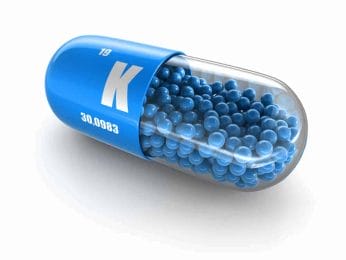
Potassium – importance for the body, sources, symptoms of deficiency and excess
Our body needs a variety of chemical compounds to function properly, some of which we naturally produce, while others should be supplied from external sources. First of all, we need vitamins from all groups, conditioning the work of many systems and internal organs, and it is safe to say that we can not do without them. Because of this, we very often forget about the supplementation of equally important minerals, elements such as potassium, the importance of which we will present in a little more detail.
Contents
- 1 What is potassium?
- 2 What is the importance of potassium for the human body?
- 3 How much are the recommended daily doses of potassium depending on age?
- 4 What does blood potassium deficiency mean and what symptoms does it give?
- 5 Can excess potassium in the blood also threaten health?
- 6 How do we naturally supply the body with potassium?
What is potassium?

The name potassium has certainly been heard by anyone who studied chemistry in school, as it is one of the most important naturally occurring elements affecting the human body, right next to sodium, zinc, calcium and magnesium. Designated in the Mendeleev system with a capital letter K belongs to the so-called macronutrients, even essential for human health.
In terms of chemical properties, it is lithium, a light alkaline metal of silvery-white color, melting at 63.25 degrees Celsius, with high chemical activity, reacting with water. Its most common form is potassium hydroxide, a corrosive substance, but it is mainly used in the chemical or cosmetic industries and in concentrations that pose no health risk.
What is the importance of potassium for the human body?
The basic chemical properties of potassium are worth knowing, but we are more interested in the importance it plays in the human body and helps take care of various aspects of health. Being an electrolyte, found in virtually every cell of the body, it performs many important functions, and the most important ones, highlighted by specialists, are:
Maintaining the body’s electrolyte balance
This is possible because it is part of the so-called sodium-potassium pump; sodium increases the volume of fluid inside the body’s cells, and the right level of potassium allows it to be lowered back down. In this way, it makes it possible to counteract any disruption of the electrolyte balance, preventing many of the diseases it causes.
Regulating the pH level of cells
That is, maintaining their acid-base balance, and any disruption of so-called homeostasis automatically disrupts the entire body. Among other things, there is a dangerous increase in the concentration of potassium in the blood serum, i.e. hyperkalemia, causing heart disorders, which can even be life-threatening.
Increased muscle tension
So much needed, if only for daily physical activity, portions of outdoor exercise allowing to prevent overweight and obesity. Providing muscles with the recommended daily doses of potassium effectively supports their work, they also take an active part in the production process of proteins that contribute to muscle tissue. Lack of potassium in the muscles will be noticed almost immediately in the form of painful cramps.
Supporting the functioning of the nervous system
The presence of potassium in the human body in the form of ions supports the functioning of the nervous system and brain, improving the conduction of nerve impulses. At the same time, it has a beneficial effect on our concentration, memory, ability to learn and assimilate large amounts of new information.
Supporting the heart and circulatory system
The human heart and other parts of the circulatory system also cannot do without proper daily recommended doses of potassium. In the case of the heart, potassium is responsible for providing it with the energy it needs to function, that is, to beat for many years without interruption. And when it comes to the cardiovascular system, the element counteracts the extremely dangerous phenomenon of aggregation, that is, the clumping together of platelets, which can, in extreme cases, lead to an increased risk of life-threatening blood clots or the development of atherosclerosis.
Other potassium effects worth noting
Of course, this is not the only action of potassium worth our attention, medicinal preparations having it in their composition are also used in the case of:
- kidney disorders resulting from abnormal water metabolism in the body, which potassium also helps to regulate;
- increased possibilities of kidney stone formation;
- regulation of the amount of insulin secretion, so this element can be used as an important element of prevention against diabetes;
- bone decalcification and osteoporosis; here potassium prevents the excretion of too much calcium in the urine.
How much are the recommended daily doses of potassium depending on age?
While the use of this element is expected to bring health benefits to the human body, it should be provided in strictly prescribed doses by specialists, depending on age, and they look as follows:
- children up to 3 years of age – 3000 mg;
- children aged 4 to 8 years – 3800 mg;
- children and adolescents from 9 to 18 years of age – 4500 mg;
- adults over the age of 18 – 4500 mg;
- pregnant women – 4700 mg;
- lactating women – 5100 mg.
What does blood potassium deficiency mean and what symptoms does it give?

The daily doses of potassium listed above are worth observing in order to enjoy full health for many years. Unfortunately, for various reasons, this is not always possible, and usually deficiencies of this valuable element are due to our own negligence, caused primarily by such factors as:
- too poor, poorly balanced diet, deprived of many nutrients, vitamin A, B vitamins, ascorbic acid and, of course, potassium;
- heavy physical exertion;
- profuse sweating causing excessive potassium secretion through the skin;
- electrolyte disturbances described above;
- infections in the gastrointestinal tract manifested by severe diarrhea or vomiting, as a result of which potassium is removed along with water;
- severe stress, especially prolonged stress, deregulating virtually the entire body, also causing a sharp drop in vitamin and mineral levels;
- taking certain groups of drugs, diuretics, or glucocorticosteroids, many of which are characterized by strong diuretic properties.
Potassium deficiency bears the scientific name of hypokalemia, consisting of a decrease in the serum normal of 3.5 – 5 mmol/L, and we can divide it into several stages:
- mild hypokalemia: 3.5-3.0 mmol/l;
- moderate hypokalemia: 3.0-2.5 mmol/l;
- severe hypokalemia: less than 2.5 mmol/l.
If there is a relatively mild potassium deficiency, it can proceed with virtually no symptoms. However, if the deficiency increases, hypokalemia will progress to a moderate or severe phase , giving such clear symptoms as:
- increasing disorders of neurological origin, weakening of reflexes, feeling of tingling and numbness of the skin, hyperactivity, abnormalities of the nervous system;
- weakening of muscle strength, which, also progressing, leads in many cases to the breakdown of muscle tissue, or rhabdomyolysis, also affects physical performance and endurance;
- increased risk of intestinal obstruction due to the fact that potassium deficiency can become a cause of painful constipation;
- irregularity of the heart muscle, especially ventricular tachycardia, i.e. the possibility of cardiac arrhythmias, sometimes even ending in a heart attack;
- increasing difficulty in urination leading, if not counteracted, to complete urinary retention.
Can excess potassium in the blood also threaten health?
Not only a deficiency, but also an excess of potassium, a condition expertly called hyperkalemia, can be a threat to health and, in extreme cases, to life. Like hypokalemia, its inverse, hyperkalemia, is also divided into three stages depending on the amount of this element in the blood serum:
- mild hyperkalemia: 5.6-6.5 mmol/L;
- moderate hyperkalemia: 6.6-7.5 mmol/l;
- severe hyperkalemia: more than 7.5 mmol/l.
As the most important causes of this condition, specialists mention:
- kidney diseases, as a result of which the excretion of excess potassium with urine is significantly impaired, and the element begins to accumulate in steadily increasing amounts;
- excess potassium in an improperly balanced diet, eating too many products that have it in their composition;
- problems with the proper transport of potassium into the body’s cells;
- taking medications and preparations that can increase its level;
- conditions that cause the release of too much potassium from cells, such as sepsis.
As for the symptoms of excess potassium in the blood, they are equally serious and should definitely not be ignored. Whenever they occur, we should immediately contact a specialist, and our suspicions should be aroused first and foremost:
- a feeling of weakness accompanying us for a long time;
- a feeling of shortness of breath that accompanies it very often;
- a feeling of confusion and lack of orientation;
- convulsions;
- too rapid fatigue, even after relatively minor physical exertion;
- disturbances in heart rhythm, most often bradycardia or ventricular fibrillation, and cardiovascular problems caused by excess potassium are also evident in the EKG test;
- in extreme cases, complete arrest of blood circulation;
- weakening of the so-called tendon reflexes, those usually examined with a hammer by a neurologist;
- abnormal sensation in the limbs, a feeling of tingling or numbness in them, called paresthesia.
How do we naturally supply the body with potassium?

As you can see from the above examples, potassium is indeed one of the most important elements, and either deficiencies or excesses of it will immediately reflect negatively on your health. Therefore, you should always maintain its recommended level, which we mostly do by taking various dietary supplements that have it in their composition. However, it is better to supply it to the body in a natural way, along with such foods as:
- fish meat, especially sea fish, mackerel, cod or halibut;
- meat, poultry, beef and pork;
- cereal products, buckwheat groats, oat or barley flakes, bran, whole-grain wholemeal bread;
- dairy products;
- chicken egg whites;
- smoked products, fish and meat;
- dried fruits, apples, prunes, figs, dates, raisins;
- fresh fruits, apples, bananas, oranges, peaches, currants, raspberries, grapes;
- legumes, dry beans and peas;
- fresh vegetables, tomatoes, potatoes, beets, spinach, carrots, white cabbage;
- fresh and dried mushrooms.
If tests show that there is too much potassium in our body and we may be at risk of various stages of hyperkalemia, it is usually sufficient to reduce the consumption of the above food groups to equalize its levels. Of course, it is worthwhile to consult a doctor about this decision, as only he will be able to properly diagnose what the actual causes of excess or deficiency of this element are and, if necessary, propose appropriate treatment.
Sources:
- https://www.healthline.com/health/potassium
- https://www.healthline.com/nutrition/potassium-deficiency-symptoms
- https://www.healthline.com/health/high-potassium-hyperkalemia
- https://www.healthline.com/health/high-and-low-potassium-foods
- https://www.healthline.com/nutrition/high-potassium-foods
- https://www.healthline.com/nutrition/foods-loaded-with-potassium


